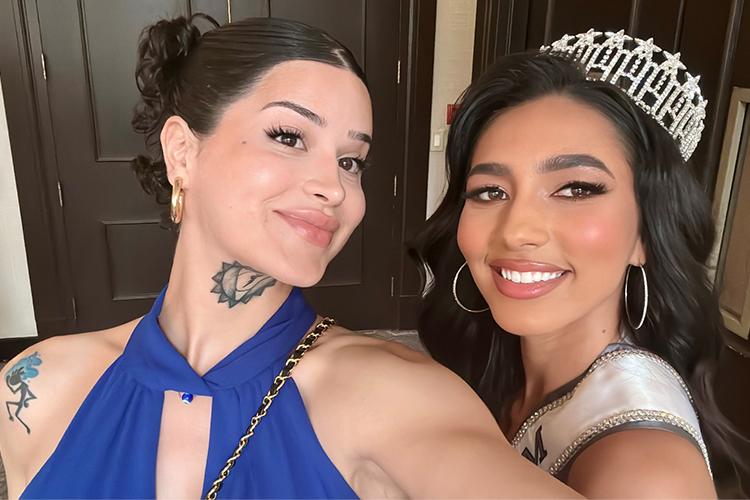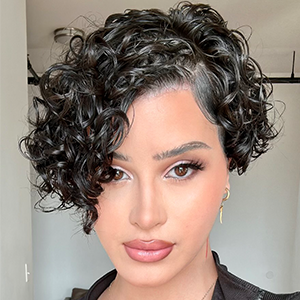This Harlem Prevention Center Peer Health Navigator Made History on the Miss New York Stage
Ocean Rivera, a peer health navigator at Columbia ICAP’s Harlem Prevention Center, was a state finalist in the 2023 Miss New York USA pageant.

Five days a week you can find Ocean Rivera at Columbia ICAP’s Harlem Prevention Center, working as a peer health navigator for transgender women who are trying to work through a complex system of gender-affirming care and resources and HIV prevention. In her off hours this summer, though, you could find her in a flurry of preparation for the Miss New York USA pageant, running from dress fittings and dance practice to makeup and photoshoots.
The competition, which took place over the first weekend in August, was a significant moment in the history of the pageant itself: Rivera was the first openly transgender woman to be named a state finalist for the title of Miss New York USA.
Even though she did not take home the 2023 title, the competition marked a “full circle moment” for Rivera, who spent years struggling to access the same resources and support that she now helps other women of trans experience navigate through her work at Columbia.
According to the National Center for Transgender Equality, one in five transgender people has been discriminated against when seeking a home and one in five transgender people has experienced homelessness at some point in their lives.
Rivera, who has experienced homelessness herself, is passionate about addressing this issue through her work at the Harlem Prevention Center, her platform as a Miss New York USA contestant, and her work as a licensed realtor.
“A few years ago, I was at rock bottom, and from here it just feels like I can go anywhere,” Rivera said. “I have an amazing job now. I’m part of a groundbreaking research study. I have an amazing career set up for me to pursue real estate and help my community. I went out for Miss New York. I was able to buy a car. My best friend lives with me. I’m coming to this point in my life where it is all just coming together.”
Since 2004, ICAP’s Harlem Prevention Center has been a hub of research for those historically underserved and disproportionately impacted by the HIV epidemic, working with community-based organizations, religious leaders, and advocates to promote community awareness of, and engagement with research. Rivera works as a peer health navigator for the National Institutes of Health-sponsored HIV Prevention Trials Network Study, I AM, which tests the feasibility and impact of providing oral pre-exposure prophylaxis (PrEP) alongside gender-affirming hormone therapy and resources to transgender women.
Columbia Neighbors recently sat down with Rivera to learn more about how she entered the world of pageants and the ways it is deeply entwined with her work at Columbia.
How did you get into the world of pageants?
I was born in Buffalo, New York, and grew up in Florida. My mom had her first child at 15 and me a couple of years later. As a teen mom, she was trying to navigate and manage the best she could, but we struggled with homelessness. That led to a lot of insecurity in me. There was never a stable foundation even when I graduated high school.
When I moved to New York City at age 20 and decided I was going to pursue my transition, I kind of fell into being without a steady foundation again. That’s when I found New York’s ballroom scene, which is how I first got introduced to this world of pageantry. Through that world, I met so many amazing people.
From there, I joined a ballroom house and started competing. I found myself liking that competition and winning trophies and being on stage under the spotlight.

I left ballroom last year and I was a little lost, asking “what’s next for me?” I was working on a real estate license, which I recently obtained, and I saw an ad for the Miss New York USA pageant come across my Instagram. Growing up, I’d always seen these women on television and they amazed me. I realized I still wanted to compete, to be beautiful, and express myself to the world.
So I applied for Miss New York and I didn’t expect much of it, but a couple of weeks later they wanted to interview me. They ended up picking me to be a state finalist.
Were you at all nervous to suddenly be on such a big stage?
A little bit, but I’m also someone who likes to work through those nerves and confront them. I was excited because, last year the Miss Universe pageant system [the umbrella under which Miss New York USA sits] was bought by a transgender woman, making it a trans-led and trans-run organization. For me to be able to represent my community was a chance to inspire girls to be able to do whatever they want.
How did you come to the work at the Harlem Prevention Center?
My coworker, Keona, has been amazing. I met her through ballroom and I was going through a career change at that point. I told her I was looking for a new job and career and she mentioned to me that the Harlem Prevention Center was looking for another peer health navigator. I met the criteria!
It has been an amazing experience. When I came on to the I AM study, we started recruiting and I was able to bring so many people from new places and organizations to the program. I was able to get Harlem Prevention Center connected to the KiKi Coalition. We have been able to provide sponsorship for multiple ballroom community-based events and get ICAP’s name out there. I was happy I was able to do that.
At the same time, I was able to bring girls into the study and get them the services they needed, like gender-affirming hormone therapy, getting access to PrEP, helping them with housing, legal name changes, and medical services.
What do people get wrong about the experiences of trans women in New York?
A lot of girls come to this city because New York is one of the leading cities for transgender healthcare. They know they can get access to healthcare and are seeking to live their lives. But coming here, some have nothing. No money, no home, no identification ... they don’t even own the name they go by. So when you have absolutely nothing, where do you go from there?
A lot of people have no idea where to start. A lot of girls deal with issues that people can’t even fathom just because they can’t have access to identification, which they need to be able to apply for a job or to get a bank account, or do anything.
Without those basic necessities or legal documents, they can’t achieve fulfilling lives. They can’t get health insurance or go certain places, so they deal with sex work, substance abuse, homeslessness, job insecurity, food insecurity, and they deal with hate on the streets. There’s still a lot of stigma around being a trans person.
A lot of our girls are not living, they’re surviving. And that’s something I’d really like to change.
We still suffer, even in New York state, because the current climate in our country has created much more turmoil toward the trans population. You are seeing girls being attacked verbally, physically, on the street, but even in their own homes. When a girl is scared to even leave her house, it's really hard to expect them to move on with their lives and start doing things, being a productive member of society, because they are so busy surviving. A lot of our girls are not living, they’re surviving. And that’s something I’d really like to change.
What did competing in the Miss New York USA pageant mean to you?
All of my trans sisters, they’ve fought so hard and literally have paved the way for me to even be out on that stage. I want to pay homage to them and show them we’ve come so far.
In some states, you can’t use the bathroom, you can’t compete in sports. And in some states, like Florida, where I grew up, you can’t even say “gay” or talk about certain things in school. For one of us to be on the stage and in the spotlight, that in itself is a win for our community and for all the girls of the future.
I hope they see that despite all of the hard times, I was able to shine. I want to do that for my community and for people to understand we are proud, we are strong, and we are good enough. Period.
What’s next for you?
In addition to my work at the Harlem Prevention Center, I really want to focus on more of my real estate work. So many girls struggle with homelessness or unstable housing, just like I did, and I want to be able to help my community and get girls housed.